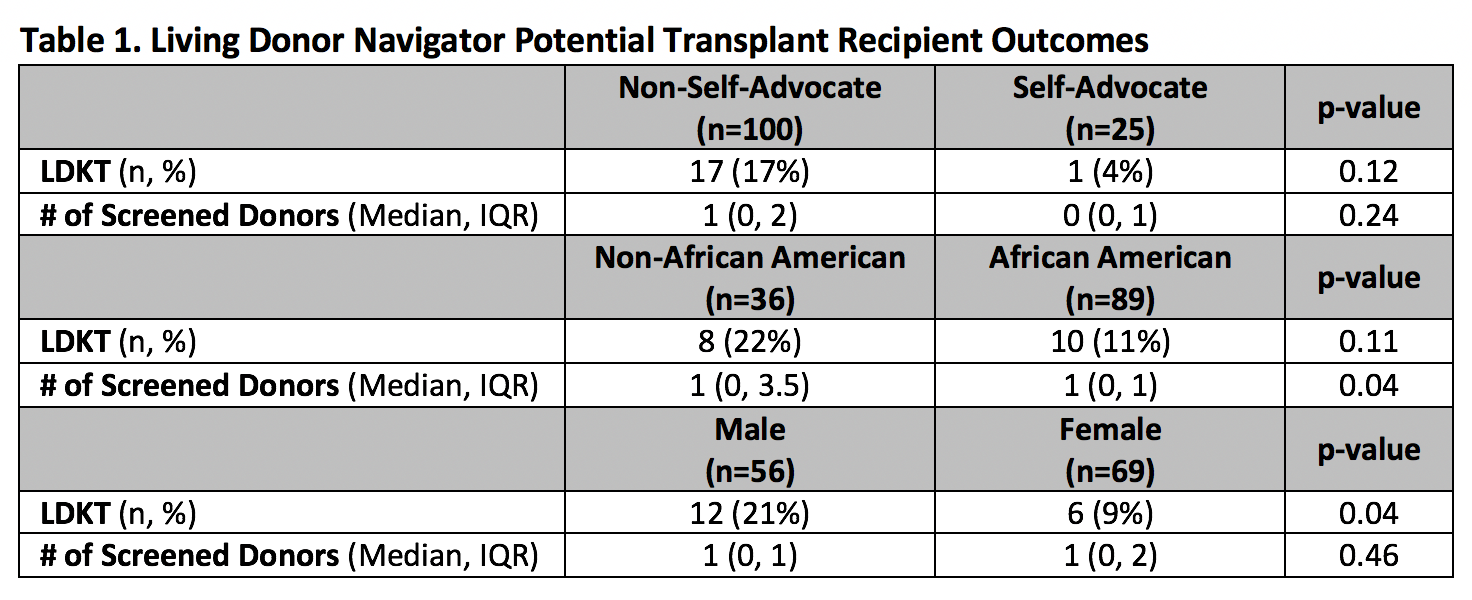Non-Self-Advocacy is Associated with Improved Access to Living Donor Kidney Transplantation
A. C. Kale, A. S. Elston, R. D. Reed, V. Kumar, B. Berry, D. Hendricks, A. Carter, B. A. Shelton, M. N. Mustian, H. Qu, P. A. MacLennan, B. J. Orandi, R. M. Cannon, M. J. Hanaway, J. E. Locke
University of Alabama at Birmingham Hospital, Birmingham, AL
Meeting: 2020 American Transplant Congress
Abstract number: B-102
Keywords: Donation, Psychosocial, Risk factors
Session Information
Session Name: Poster Session B: Kidney Psychosocial
Session Type: Poster Session
Date: Saturday, May 30, 2020
Session Time: 3:15pm-4:00pm
 Presentation Time: 3:30pm-4:00pm
Presentation Time: 3:30pm-4:00pm
Location: Virtual
*Purpose: Our Living Donor Navigator (LDN) program aims to help potential transplant recipients (PTRs) identify live donors with the help of an advocate. These advocates are friends or family of PTRs who undergo training to increase awareness of living donor kidney transplantation (LDKT) and their PTR’s story. The impact of advocates on PTRs’ access to living donor kidney transplantation (LDKT) is not understood. We hypothesized that PTRs who did not have an advocate and served as a self-advocate had decreased access to LDKT.
*Methods: This single center, retrospective study utilized our institution’s transplant database to identify PTRs enrolled in the LDN program from 04/2017-06/2019. PTRs were categorized by advocate relationship and Chi-squared/Fisher’s or Wilcoxon tests were performed to determine if self-advocacy was associated with lower rates of LDKT and number of screened donors.
*Results: 125 PTRs were included in this study, of which 20% served as self-advocates (n=25). Among non-self-advocates, the most prevalent advocate relationship was spouse (46%). Having a spousal advocate was associated with significantly increased LDKT in comparison to any other advocate type (24% vs. 9%, p=0.02). Compared to non-self-advocates, self-advocacy was associated with fewer screened donors (median 0, IQR [0,1] vs. median 1, IQR [0,2], p=0.24) and decreased LDKT (4% vs. 17%, p=0.12). Of self-advocates, 84% were African American (AA) and 68% were female. AAs had significantly fewer screened donors (median 1, IQR [0,1] vs. median 1, IQR [0,3.5], p=0.04) and decreased LDKT compared to non-AAs (11% vs. 22%, p=0.11), while female gender was associated with similar numbers of screened donors in comparison to males (median 1, IQR [0,2] vs. median 1, IQR [0,1], p=0.46), but significantly fewer LDKT (9% vs. 22%, p=0.04; Table 1).
*Conclusions: These data suggest that self-advocacy is associated with fewer donor screenings and lower rates of LDKT. The majority of self-advocates were female and/or AA, suggesting that these populations may be at higher risk for an inadequate support system. Alternatively, non-self-advocacy is associated with improved access to LDKT. Spouses may serve as the best advocates for patients in search of LDKT.
To cite this abstract in AMA style:
Kale AC, Elston AS, Reed RD, Kumar V, Berry B, Hendricks D, Carter A, Shelton BA, Mustian MN, Qu H, MacLennan PA, Orandi BJ, Cannon RM, Hanaway MJ, Locke JE. Non-Self-Advocacy is Associated with Improved Access to Living Donor Kidney Transplantation [abstract]. Am J Transplant. 2020; 20 (suppl 3). https://atcmeetingabstracts.com/abstract/non-self-advocacy-is-associated-with-improved-access-to-living-donor-kidney-transplantation/. Accessed February 19, 2026.« Back to 2020 American Transplant Congress

